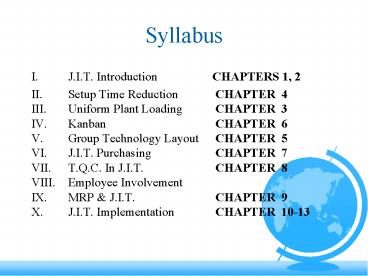Syllabus - PowerPoint PPT Presentation
1 / 12
Title: Syllabus
1
Syllabus
- I. J.I.T. Introduction
CHAPTERS 1, 2 - II. Setup Time Reduction CHAPTER 4
- III. Uniform Plant Loading CHAPTER 3
- IV. Kanban CHAPTER 6
- V. Group Technology Layout CHAPTER 5
- VI. J.I.T. Purchasing CHAPTER 7
- VII. T.Q.C. In J.I.T. CHAPTER 8
- VIII. Employee Involvement
- IX. MRP J.I.T. CHAPTER 9
- X. J.I.T. Implementation CHAPTER 10-13
2
I. J.I.T. Introduction
- What Is Just -in-Time?
- Or What Is a J.I.T. System?
- Keeping inventory close to zero
- Getting materials just in time when you need them
- Manufacture just what you need for orders
- Decreasing mfg costs
- Create special relationships with your suppliers
- Simplify processes
- Minimize waste
- Reduce cycle time
- Locating suppliers close by
- Lower variance
- Jit primarily used for large scale production
- Production, materials-are processed just in time
when you need them - Implement TQM
- MRP VS JIT
3
A. Historical Perspective
- J.I.T. System/Philosophy Was Developed by Mr.
OHNO (Vice President for Manufacturing - Toyota) - 1960 - 1975 Development
- Incremental Improvement
- Japanese Companies Did Not Begin to Use the
J.I.T. System Until 1973 - 1979 - 80 Many U.S. Executives (Especially Auto
Executives, Univ. Professors) Visited Japanese
Companies. What Was J.I.T.? - Hewlett - Packard, Xerox, Ford, GM (and Many
Other Companies) Switched Plants to the J.I.T.
System.
4
B. J.I.T. Definition
- According to Toyota - J.I.T. Philosophy Aims at
Reducing or Eliminating Waste From Manufacturing,
Purchasing, Manufacturing Support, and
Distribution Activities. - Key Word Waste
- Toyota Definition Anything Other Than the
Minimum Amount of Equipment, Materials, Parts,
and Working Time Absolutely Essential to
Production. - U.S.A. Definition Anything That Does Not Add
Value to the Product, Is Waste.
5
Definition of Waste
- Example Purchasing an Item in an Organization
- Contact Suppliers
- Ask for Bids
- Choose One (Lower Price/Schedule/Quality)
- Place an Order
- Receive Shipment
- Inspect
- Update Records
- Transport and Stock Item----supplier supplies at
the user site - User Comes to Storeroom
- Update Records
- Move Materials to User
- Receive Invoice BACKFLUSHING
- Match Receipt, Invoice, Inspection
- Authorize Payment
6
Definition of Waste (Contd.)
- All Wasteful Under J.I.T.
- Material Delivered to Machine That Will Process
It - Getting Rid of Accounts Payable - Backflushing
- Send a Check for Parts Purchased Based Upon
Product Shipped - Productive - Changing Material Physically.
7
C. Another Definition of J.I.T. J.I.T. Ratio -
for Those Quantitatively Minded
Lot size 500 Component XYZ Unit Time C 1
min. M 2 min. D 1 min. A. 1 min.
Lead time - 115 hours Setup queue production
J.I.T. Ratio
Lead time - 115 (60) 1380 Work content
5
Ideal 1 to 2 Good 3 to 4 Bad anything else
C M D A
Eliminate setup time lot size 1 Change layout
8
D. View of Inventory in J.I.T.
- Traditional
- Typical Manufacturing - a Large Amount Necessary
in Front of Work Centers. - Why? Setup Time
- Safeguard Against Breakdown (Feeding Machine)
- Safeguard Against Quality Problems
- Safeguard Against Absenteeism
9
E. Basics of J.I.T., S.P.C. Emerged in U.S.
(J.I.T. - Refinement /Evolution From Scientific
Management)
- Model T in 1926
10
F. J.I.T. Going Back to Basics (ABCs) of
Production Management
- Making Useful Product - Minimum Cost. - High
Quality - Minimum Time
11
G. Components of J.I.T.
- What Does This Mean?
- How Does It Differ From Traditional
Manufacturing? - What Kinds of Wastes Are Reduced/Eliminated by
This Technique?
12
H. Benefits of a J.I.T. System































